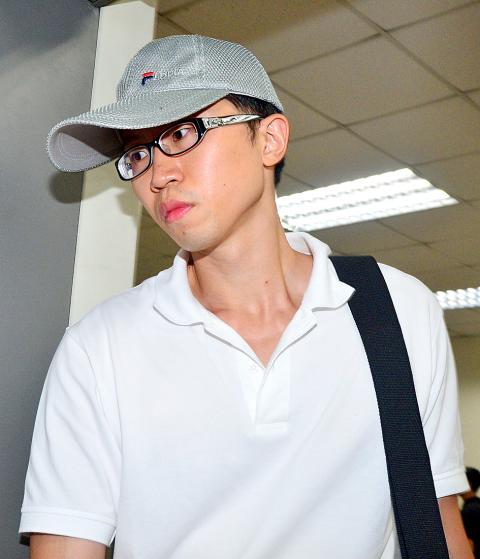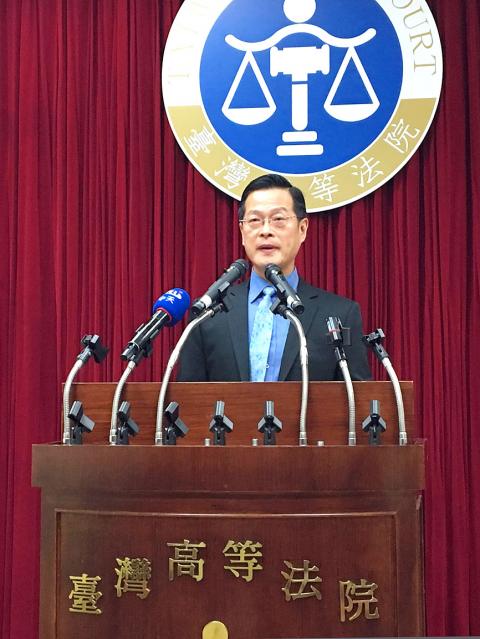The Taiwan High Court yesterday reversed earlier rulings on a Taipei murder case dating from 2000 and found the defendant, Lu Chieh-min (呂介閔), not guilty.
The ruling said that the court’s decision was based on new DNA tests of bodily fluids found on the female victim.
Lu, now 35, was found not guilty of murder due to a lack of evidence in the first and second rulings. However, in subsequent court-mandated retrials, he received a guilty verdict and was sentenced to a 13-year prison term in 2010.

Photo: Taipei Times
After 10 years of judicial proceedings and exhausting his appeals, Lu was incarcerated and has since served four years of his sentence.
In May, new evidence was presented for re-examination using the latest DNA testing technique.
Lu was charged with the murder of his girlfriend, surnamed Kuo (郭), after her body was found at a public park in Taipei’s Neihu District (內湖) in July 2000.

Photo: CNA
Kuo’s body showed evidence of trauma to her head — it was suspected that she was struck by a blunt object — and there was a bite mark on her left breast, along with indications that she was sexually assaulted.
A criminal investigation and evidence suggested that the two had an argument over Lu’s decision to date other women, quarreling at the park when Lu allegedly hit her with a blunt weapon, killing Kuo, and then partially removed her clothing and underwear.
Prosecutors said the bite mark on Kuo’s left breast was a “love bite” by Lu, and a coroner’s report said the mark conformed to features of Lu’s teeth.
“The new DNA testing showed that the saliva left on the female victim’s body did not match the defendant’s DNA. Therefore we concurred that the bite mark was not made by the defendant,” Taiwan High Court spokesman Chou Ying-wen (周盈文) said about yesterday’s ruling. “Also, DNA from semen samples taken from the victim’s body and underwear did not match Lu’s DNA.”
However, there were still questions and doubts over the case.
“All of the evidence points to Lu as my daughter’s killer, but now DNA testing shows it was not him. Then who was the murderer? Can the courts give justice to my daughter? They must help us to find the murderer,” Kuo’s mother said yesterday.
Chou said that in the first and second trials, Lu had confessed to leaving the bite mark on the victim. However, the court took into consideration that Lu was influenced by the forensic report at the time, which indicated the bite mark conformed to Lu’s teeth.
Chou said that public prosecutors would not appeal yesterday’s verdict to the Supreme Court, unless there were extraordinary circumstances, such as “cited legal reasons for the verdict having contravened the Constitution, or contravened legal interpretation by the Judicial Yuan, or contravened other precedent rulings.”

Three Taiwanese airlines have prohibited passengers from packing Bluetooth earbuds and their charger cases in checked luggage. EVA Air and Uni Air said that Bluetooth earbuds and charger cases are categorized as portable electronic devices, which should be switched off if they are placed in checked luggage based on international aviation safety regulations. They must not be in standby or sleep mode. However, as charging would continue when earbuds are placed in the charger cases, which would contravene international aviation regulations, their cases must be carried as hand luggage, they said. Tigerair Taiwan said that earbud charger cases are equipped

Foreign travelers entering Taiwan on a short layover via Taiwan Taoyuan International Airport are receiving NT$600 gift vouchers from yesterday, the Tourism Administration said, adding that it hopes the incentive would boost tourism consumption at the airport. The program, which allows travelers holding non-Taiwan passports who enter the country during a layover of up to 24 hours to claim a voucher, aims to promote attractions at the airport, the agency said in a statement on Friday. To participate, travelers must sign up on the campaign Web site, the agency said. They can then present their passport and boarding pass for their connecting international

UNILATERAL MOVES: Officials have raised concerns that Beijing could try to exert economic control over Kinmen in a key development plan next year The Civil Aviation Administration (CAA) yesterday said that China has so far failed to provide any information about a new airport expected to open next year that is less than 10km from a Taiwanese airport, raising flight safety concerns. Xiamen Xiangan International Airport is only about 3km at its closest point from the islands in Kinmen County — the scene of on-off fighting during the Cold War — and construction work can be seen and heard clearly from the Taiwan side. In a written statement sent to Reuters, the CAA said that airports close to each other need detailed advanced

WEATHER Typhoon forming: CWA A tropical depression is expected to form into a typhoon as early as today, the Central Weather Administration (CWA) said yesterday, adding that the storm’s path remains uncertain. Before the weekend, it would move toward the Philippines, the agency said. Some time around Monday next week, it might reach a turning point, either veering north toward waters east of Taiwan or continuing westward across the Philippines, the CWA said. Meanwhile, the eye of Typhoon Kalmaegi was 1,310km south-southeast of Oluanpi (鵝鑾鼻), Taiwan’s southernmost point, as of 2am yesterday, it said. The storm is forecast to move through central